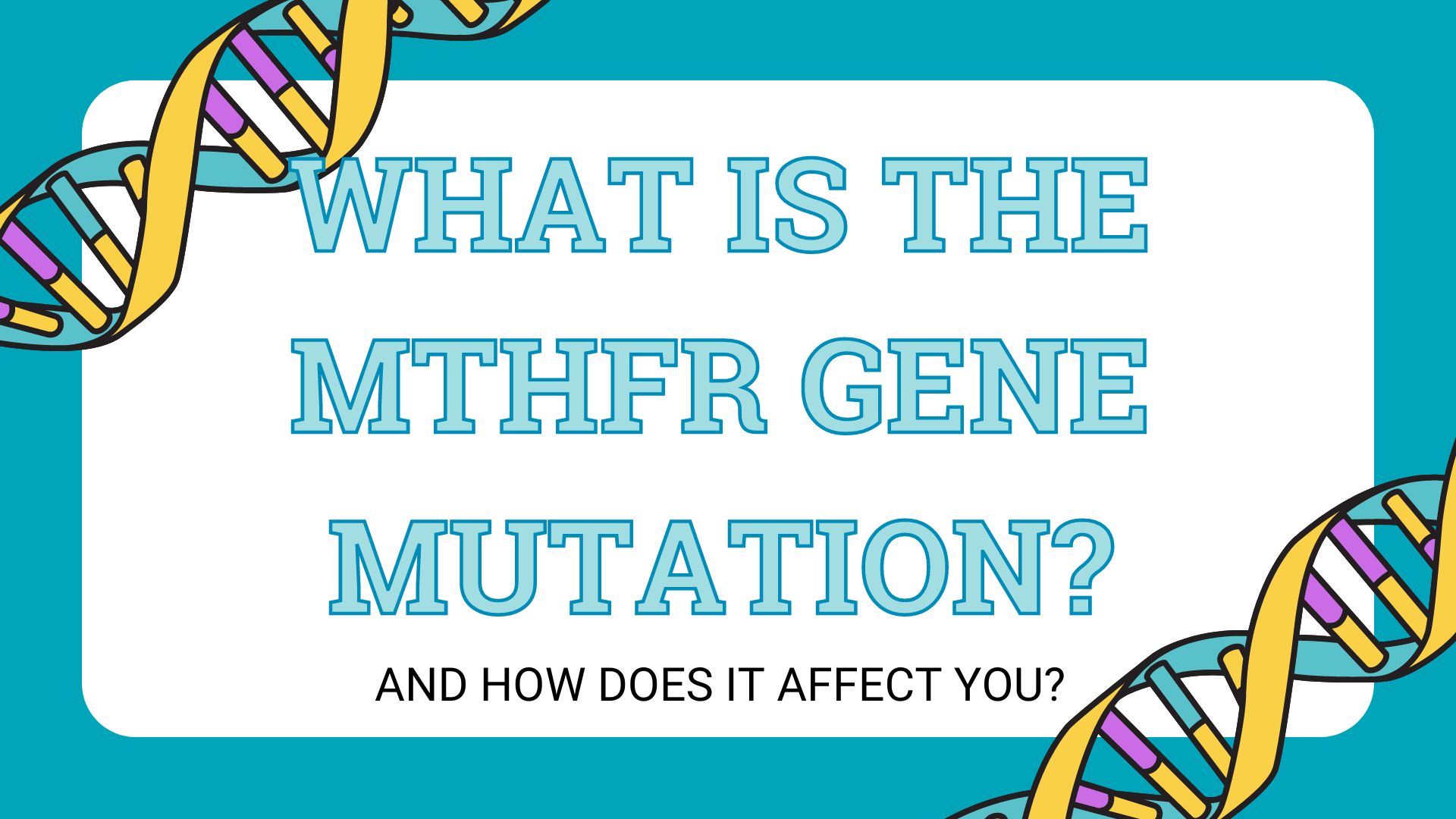
What Is the MTHFR Gene Mutation? And How Does It Affect You?
In recent years, the MTHFR gene has garnered attention for its role in various health conditions and how its mutations can impact your well-being. From cardiovascular health to mental wellness, understanding the implications of MTHFR gene mutations can provide valuable insights into personalized healthcare and lifestyle choices.
Join us as we explore the science behind MTHFR gene mutations and uncover their potential effects on our health and everyday lives.
What Are the Health Implications of the MTHFR Gene Mutations?
Mutations in the MTHFR gene can lead to a variety of health issues, largely due to their impact on your body’s ability to process folate and homocysteine.
A few quick definitions:
Folate
Folate, also known as vitamin B9, is a water-soluble vitamin that plays a crucial role in various bodily functions, particularly in cell division and DNA synthesis. It is essential for the formation of red blood cells and the proper development of the fetal neural tube during pregnancy, which is critical for preventing birth defects like spina bifida. Folate is naturally found in foods such as leafy green vegetables, citrus fruits, beans, and fortified grains.
Note: In supplement form, it is often referred to as folic acid. Folic acid is the synthetic version of folate. This will be an important element to note later in this blog.
Homocysteine
Homocysteine is an amino acid that is produced in the body as part of the process of breaking down the amino acid methionine. Under normal conditions, homocysteine levels are kept in check through various biochemical pathways. However, elevated levels of homocysteine in the blood may indicate problems with these metabolic pathways and are associated with an increased risk of cardiovascular disease, stroke, and other health issues. Factors such as genetic predisposition, poor diet, smoking, and certain medical conditions can contribute to high homocysteine levels. Monitoring and managing homocysteine levels may help with maintaining cardiovascular health.
Now that we’ve defined folate and homocysteine, let’s talk about how the MTHFR mutation can affect your body’s ability to process them.
Some of the key health problems associated with MTHFR mutations include, but are not limited to:
- Elevated Homocysteine Levels: One of the direct consequences of MTHFR mutations is elevated levels of homocysteine, an amino acid in the blood, which is linked to an increased risk of heart diseases, stroke, and peripheral vascular diseases.
- Cardiovascular Disease: The inability to properly metabolize homocysteine can lead to its accumulation, contributing to the development of heart disease and stroke by promoting atherosclerosis (hardening of the arteries).
- Neurological and Psychiatric Disorders: There’s mixed (inconclusive) evidence suggesting the possibility of a link between MTHFR mutations and an increased risk of various neurological and psychiatric conditions, including depression, anxiety, bipolar disorder, and schizophrenia. According to research published in a 2022 article in Frontiers, MTHFR C677T in particular is associated with increased risk of major depressive disorder, bipolar disorder, and schizophrenia. The exact mechanisms are not fully understood but may relate to the role of folate in neurotransmitter synthesis and DNA methylation.
- Increased Cancer Risk: Some studies suggest that MTHFR mutations may be linked to a slightly increased risk of certain cancers, including but not limited to colon cancer and leukemia, possibly due to effects on DNA synthesis and repair.
- Studies have also show a link between MTHFR mutations and Pregnancy Complications and Birth Defects.
What to Do If You Have the MTHFR Mutation
While the thought of having a genetic mutation can sound daunting at first, remember knowledge is power. There are many things you can do:
Supplements to Help
If someone has an abnormal MTHFR genotype, such as the common C677T or A1298C mutations, they may have reduced efficiency in converting folate (vitamin B9) to its active form, methylfolate.
Here are some dietary supplements that might be helpful:
- Methylfolate (L-Methylfolate): This is the bioactive form of folate that can be directly utilized by the body, bypassing the need for conversion by the MTHFR enzyme.
- Vitamin B12 (Methylcobalamin or Hydroxocobalamin): B12 works closely with folate in the methylation cycle. Using methylcobalamin or hydroxocobalamin forms of vitamin B12 can be more effective, as they are more readily utilized by individuals with MTHFR mutations.
- Omega-3 Fatty Acids: These can support brain health and function, contributing to improved mood and cognitive function. Omega-3s are not directly related to the MTHFR mutation but can be beneficial for overall physical and mental health.
- Vitamin B6 (Pyridoxal-5-Phosphate): B6 in its active form, Pyridoxal-5-Phosphate (P-5-P), is crucial for the metabolism of homocysteine and the synthesis of neurotransmitters. It helps in the conversion of homocysteine to methionine, a reaction that can be affected by MTHFR mutations.
- Zinc: Zinc can also support the methylation process, making it a helpful supplement.
A word of caution: don’t grab the synthetic folic acid!
For individuals with the MTHFR gene mutation or other conditions that affect folate metabolism, avoiding folic acid (synthetic form of folate) and opting for methylfolate or natural sources of folate may be recommended. This is because some individuals may have difficulty metabolizing folic acid efficiently, which can lead to elevated levels of unmetabolized folic acid in the bloodstream.
Excessive levels of unmetabolized folic acid have been associated with potential adverse health effects, although more research is needed to fully understand the implications.
Foods to Eat
If you have the MTHFR gene mutation, focusing on foods rich in natural forms of folate, as well as other nutrients involved in methylation processes, may be beneficial.
Here are some examples of foods that are high in these nutrients:
- Leafy Green Vegetables: Spinach, kale, Swiss chard, and other leafy greens are excellent sources of folate. They also contain other essential nutrients like vitamins A, C, and K, as well as minerals like iron and magnesium.
- Legumes: Beans, lentils, chickpeas, and peas are rich in folate, fiber, and protein. They are versatile ingredients that can be incorporated into various dishes, such as soups, salads, and stews.
- Cruciferous Vegetables: Broccoli, Brussels sprouts, cauliflower, and cabbage are not only high in folate but also contain compounds that support detoxification processes in the body.
- Avocado: Avocados are a good source of folate, as well as healthy fats, fiber, and potassium. They can be enjoyed on toast, in salads, or blended into smoothies.
- Citrus Fruits: Oranges, lemons, limes, and grapefruits are rich in vitamin C, which is important for supporting immune function and enhancing iron absorption. Some citrus fruits also contain folate.
- Beets: Beets are packed with folate, as well as antioxidants and dietary nitrates that support cardiovascular health. They can be roasted, steamed, or grated raw into salads.
- Asparagus: Asparagus is a good source of folate and contains compounds that support liver health and detoxification processes.
- Eggs: Eggs are rich in several nutrients, including folate, choline, and B vitamins. They can be prepared in various ways, such as boiled, scrambled, or poached.
- Nuts and Seeds: Walnuts, almonds, flaxseeds, and chia seeds are good sources of folate, as well as healthy fats, protein, and fiber. They can be added to oatmeal, yogurt, or salads for an extra nutritional boost.
- Seafood: Fish such as salmon, trout, and tuna are rich in folate, omega-3 fatty acids, and protein. They are also sources of vitamin D, which is important for bone health and immune function.
It’s essential to maintain a balanced and varied diet that includes a wide range of nutrient-rich foods to support overall health and well-being, especially if you have the MTHFR gene mutation. Additionally, consulting with a healthcare professional or registered dietitian can provide personalized dietary recommendations based on your individual needs and health status.
Lifestyle Modifications
In addition to focusing on dietary choices, there are several lifestyle tips that individuals with the MTHFR gene mutation may find beneficial:
- Regular Exercise: Engaging in regular physical activity can help support overall health and well-being. Aim for a combination of cardiovascular exercise, strength training, and flexibility exercises to promote heart health, maintain muscle mass, and improve mobility.
- Stress Management: Chronic stress can negatively impact methylation processes in the body. Practice stress-reducing techniques such as mindfulness meditation, deep breathing exercises, yoga, or tai chi to promote relaxation and reduce the harmful effects of stress.
- Adequate Sleep: Prioritize getting enough high-quality sleep each night. Aim for 7-9 hours of sleep per night to support optimal physical and mental health. Establishing a regular sleep schedule and creating a relaxing bedtime routine can help improve sleep quality. Avoid blue light for 1-2 hours before bed. (Find out why here.)
- Limit Alcohol and Caffeine: Excessive alcohol consumption can interfere with folate metabolism and methylation processes in the body. Limit alcohol intake to moderate levels, or avoid it altogether if possible. Similarly, limit caffeine intake, especially in the afternoon and evening, to promote better sleep quality.
- Avoid Environmental Toxins: Exposure to environmental toxins such as heavy metals, pesticides, and air pollutants can disrupt methylation processes and contribute to health problems. Minimize exposure to these toxins by choosing organic foods, using natural cleaning and personal care products, and avoiding smoking and secondhand smoke. (Need better personal care products? The Environmental Working Group has a database of clean products.)
- Stay Hydrated: Drink plenty of water throughout the day to stay hydrated and support overall health. Hydration is essential for proper detoxification processes in the body and helps maintain optimal cellular function.
- Quit Smoking: Smoking tobacco can impair folate metabolism and increase the risk of cardiovascular disease and other health problems. If you smoke, consider quitting to improve your overall health and reduce the negative impact on methylation processes.
- Supplement Wisely: In addition to dietary folate sources, consider supplementing with methylfolate or other methylated B vitamins to support methylation processes in the body.
By incorporating these lifestyle tips into your daily routine, you can support optimal methylation processes and overall health, even with the MTHFR gene mutation. It’s important to focus on holistic health practices that address diet, exercise, stress management, and environmental factors to promote well-being and reduce the risk of chronic disease.
How Do You Know If You Have an MTHRF Mutation?
There are several labs that offer testing for MTHFR mutations. MTHFR testing can help identify mutations in the MTHFR gene, which can affect processes in the body such as DNA synthesis and repair, metabolism of certain amino acids, and the conversion of homocysteine to methionine.
Here are general options for testing:
- Clinical Laboratories: Many clinical diagnostic labs offer MTHFR mutation testing. This includes large national laboratories as well as specialized genetic testing companies. You would typically need a doctor’s order to get tested at these labs.
- Direct-to-Consumer Genetic Testing Companies: Some companies offer genetic testing kits that you can order online, which may include MTHFR mutation analysis. These services vary in terms of what they offer, their accuracy, and their privacy policies, so it’s important to do thorough research.
- Healthcare Provider: Some healthcare providers have the capability to order MTHFR testing directly through their associated laboratories. This might be a more integrated approach to testing, as it allows you to discuss the results and their implications directly with your healthcare provider.
Note: If you’re looking to get tested, the NextStep team recommends either option #1 or #3.
When looking for a lab to test for MTHFR mutations, consider the following:
- Accreditation: Ensure the lab is accredited by a recognized body, such as the College of American Pathologists (CAP) or has CLIA certification, indicating it meets standards for laboratory testing.
- Privacy Policies: Understand how your genetic information will be used and shared, especially with direct-to-consumer options.
- Comprehensiveness: MTHFR mutation testing can focus on one or several mutations, commonly C677T and A1298C. Make sure the testing covers the mutations you’re concerned about.
- Cost and Insurance Coverage: Costs can vary widely, and insurance coverage for MTHFR testing is variable. Check with your insurance provider and the testing service to understand any out-of-pocket costs.
If you need specific names of labs or more detailed guidance on how to proceed with MTHFR testing, it’s best to consult with a healthcare provider or a genetic counselor. They can provide personalized advice and may be able to recommend specific labs based on your health history and needs.
How We Can Help
If you suspect that MTHFR gene mutation is connected to a psychiatric disorder, don’t hesitate to reach out for help. Our multidisciplinary team is here to help you get the care you need.
To make an appointment, click here to get started.
Related Posts
Fear and Phobia: What’s the Difference?
A phobia is an aberrant or extreme fear of something. In some cases, the fear is...
How to Spot the Signs of Depression in Kids
Depression in children can be difficult to recognize, especially since kids often...


